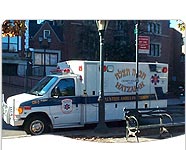 
"How do low-carbohydrate and conventional diets compare in patients with severe obesity?"
A randomized study comparing the effects of a low-carbohydrate diet and a conventional diet on
lipoprotein subfractions and C-reactive protein levels in patients with severe obesity.
Purpose
To compare the effects of a low-carbohydrate diet and a conventional (fat- and calorie-restricted)
diet on lipoprotein subfractions and inflammation in severely obese subjects.
Methods
We compared changes in lipoprotein subfractions and C-reactive protein levels in 78 severely obese
subjects, including 86% with either diabetes or metabolic syndrome, who were randomly assigned to
either a low-carbohydrate or conventional diet for 6 months.
Results
Subjects on a low-carbohydrate diet experienced a greater decrease in large very low-density
lipoprotein (VLDL) levels (difference = -0.26 mg/dL, P = 0.03) but more frequently developed detectable
chylomicrons (44% vs. 22%, P = 0.04).
Both diet groups experienced similar decreases in the number of low-density lipoprotein (LDL)
particles (difference = -30 nmol/L, P = 0.74) and increases in large high-density lipoprotein (HDL)
concentrations (difference = 0.70 mg/dL, P = 0.63).
Overall, C-reactive protein levels decreased modestly in both diet groups. However, patients
with a high-risk baseline level (>3 mg/dL, n = 48) experienced a greater decrease in C-reactive
protein levels on a low-carbohydrate diet (adjusted difference = -2.0 mg/dL, P = 0.005), independent
of weight loss.
Conclusion
In this 6-month study involving severely obese subjects, we found an overall favorable effect of a
low-carbohydrate diet on lipoprotein subfractions, and on inflammation in high-risk subjects. Both diets
had similar effects
Source: Am J Med 2004 Sep 15;117(6):398-405.
The above message comes from "Am J Med", who is solely responsible for its content.
The above is for general informational purposes only. Always consult your
physician regarding specific medical issues and call Hatzalah or your local
ambulance service in the event of an emergency.
Back to Digest Index
|









